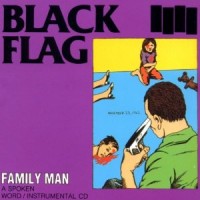By 1984, Black Flag were gods in the punk rock scene. Not only had their previous albums, Damaged and My War, solidified their lineup with Henry Rollins on vocals. They’d become notorious for the chaotic and violent nature of their live shows, though in the mid-eighties the punk scene was unquestionably more violent as a whole than it is today. Which made Family Man such an oddball release, as it separated the band from its vocalist on all but one track.
I remember getting this on CD when I was in my late teens or early twenties, and thinking Henry Rollins was this crazy bad ass poet that was speaking to my worldview. At thirty-one, I think my younger self didn’t know anything about poetry. To be fair, the year this album was released was the same year Mark Smith started hosting open mic poetry readings, which would eventually evolve into slam poetry. So, what Rollins was doing was very much on the cutting edge at that time. After helping organize the poetry slam in my hometown for about a year, I find myself looking at all of these pieces two ways. First, are they an attempt at honest artistic expression regardless of their quality? Knowing what I know about Rollins, I think they do honestly represent where he was at during that time in his life. I also know, he constantly mocked his poetry … especially from this time in his life.
The second thing was the issue: was this actually good? No, it was not. It sounded like a twenty something trying to sound dark and mysterious for the sake of being dark, mysterious, and anti-social on purpose. While his delivery would improve as time passed, as it would for anyone, he really sounded like he’s trying to force a mood rather than create one. I’m a huge fan of Henry’s work, but coming back to this now … I just don’t get it.
The one song on this album the featured vocals and music, was “Armageddon Man.” And it was actually a really solid track. Rollins' vocals were exactly what you’d expect from him at this point in Black Flag’s career, but the lyrics on this song actually worked so much better than his previous poetry did. They actually came off as stream of consciousness as opposed to the previous material which sounded forced and pretentious. The band continued their dive into blending hardcore with metal and some of the harder to listen to live albums Miles Davis would release in the 70’s. It was a lot of noise, it was a lot of chaos, but dammit if it didn't work. Black Flag lost a lot of appeal for me as they moved away from their hardcore punk days and started incorporating new elements, but this song worked because it was spontaneous and didn't come off as over rehearsed.
The second half of this album countered the first by presenting all instrumentals. Some of them worked mostly because Greg Ginn could improvise. Don’t take that the wrong way- everyone in this band was a great player. Kira showed herself to be a great bass player in Dos, and Bill Stevenson’s legacy speaks for itself. But Greg Ginn, in addition to being a great guitarist, was also a bit of a control freak. As such, the rhythm section didn't do a lot more than give Greg something to play over. He did this quite well, showing himself to be a talented player. If nothing else, this was likely where the idea for Greg’s instrumental band Gone found its roots.
All in all, this felt like a real transitional album not so much for the band as it does the members. Henry Rollins career as a spoken word artist would get its start here, albeit a rough one. Greg Ginn also started doing instrumental rock here, something that would come to dominate his repertoire in nearly all projects outside of Black Flag. This isn’t to knock Kira or Bill’s contributions to this band or their respective careers outside of Black Flag, but their voices as musicians outside of this band were never shaped, musically at least, by the direction this band took.
